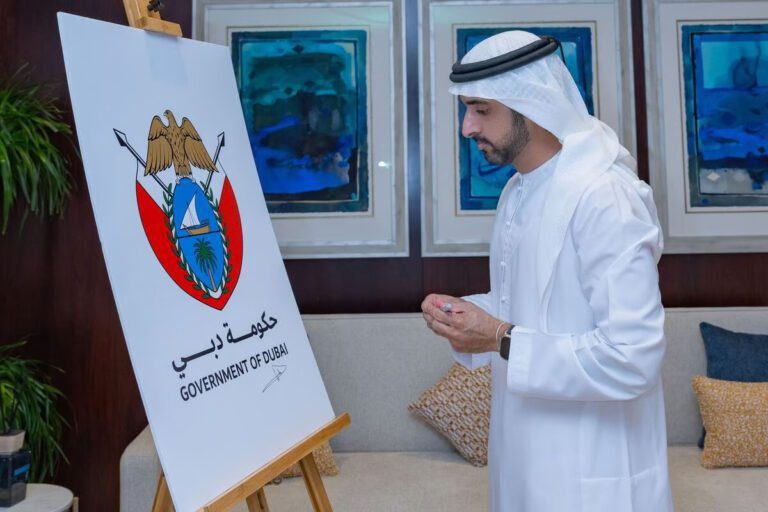Under the guidance of His Highness Sheikh Mohammed bin Rashid Al Maktoum, Vice President, Prime Minister, and Ruler of Dubai, H.H. Sheikh Hamdan bin Mohammed bin Rashid Al Maktoum, Crown Prince of Dubai and Chairman of The Executive Council of Dubai, chaired the inaugural meeting of The Executive Council of Dubai following its recent restructuring.
During the session, H.H. Sheikh Hamdan approved the unveiling of the Government of Dubai’s new logo and allocated AED 40B for the ‘Dubai Portfolio for Public-Private Partnership’ covering 2024-2026. Additionally, His Highness endorsed Dubai’s ‘Affordable Housing Policy’ and the launch of the ‘Dubai Sandbox’ initiative, aimed at nurturing 100 tech ventures initially.
Sheikh Hamdan Praises and Welcomes Executive Council Members
Sheikh Hamdan praised the former Council members for enhancing Dubai’s global standing and welcomed the new members, underscoring the reconstituted Executive Council’s role in fortifying the government’s operational framework and Dubai’s stature.
“The newly formed Executive Council of Dubai will be the driving force for constructive change in Dubai, playing a vital role in fostering sustainable development, enhancing the welfare of the populace, and fortifying Dubai’s global prominence,” remarked His Highness.
The meeting, held at Emirates Towers, was attended by H.H. Sheikh Maktoum bin Mohammed bin Rashid Al Maktoum, First Deputy Ruler of Dubai, Deputy Prime Minister, Minister of Finance of the UAE, and Deputy Chairman of The Executive Council of Dubai; H.H. Sheikh Ahmed bin Mohammed bin Rashid Al Maktoum, Second Deputy Ruler of Dubai and Deputy Chairman of The Executive Council of Dubai; and His Highness Sheikh Ahmed bin Saeed Al Maktoum, President of the Dubai Civil Aviation Authority and Deputy Chairman of The Executive Council of Dubai.
“We have revitalized Dubai’s iconic old emblem and adopted it as the new emblem for the Government of Dubai. The new emblem embodies the emirate’s visionary leadership, transformative journey of development, and evolution into a city of the future,” stated His Highness.
His Highness noted that the government’s identity extends beyond the emblem, encompassing dedicated teams committed to serving and operating under a culture of efficiency and excellence, emphasizing their role as the cornerstone of Dubai’s success as a premier global city and a preferred destination for living and working.
His Highness directed the General Secretariat of The Executive Council of Dubai to ensure the immediate implementation of the new emblem across Dubai’s Government entities. Alongside adopting the new emblem, entities will retain their individual symbols to reflect their uniqueness, according to Khaleej Times.
AED 40B to boost development projects
During the meeting, The Executive Council of Dubai sanctioned AED 40B for the ‘Dubai Portfolio for Public-Private Partnership’. Managed by the Department of Finance through the Dubai Digital Platforms, the portfolio aligns with the objectives outlined in the Dubai Economic Agenda, D33. These goals include increasing government spending to AED 700B, raising private sector investment in development projects to AED 1T, and boosting foreign direct investment to AED 650B by 2033.
Since its inception in 2021, the portfolio has seen growth in both its value and the number of public-private partnership projects. Initially comprising 30 projects in sectors such as infrastructure, public transport, and urban development, valued at over AED 25B, it highlights the significant role of private companies as strategic partners in the emirate’s development.
Affordable Housing Policy
The ‘Affordable Housing Policy’ aligns with the objectives of Dubai’s 2040 Urban Master Plan, aimed at fostering vibrant and healthy communities by providing diverse job opportunities and addressing housing needs.
This policy will cater to various societal segments, offering a range of housing options suitable for individuals across different income levels. Additionally, it will facilitate the development of new accommodations for workers near their workplaces, improving the quality of these facilities and ensuring the provision of adequate services for all societal segments.
Aligned with Dubai’s commitment to enhancing its global standing as a premier destination for living and working, the policy seeks to reinforce social cohesion and improve urban development. Multiple entities, including Dubai Municipality, the Roads and Transport Authority, Dubai Land Department, and Dubai Electricity and Water Authority, are involved in implementing the policy.
Dubai Sandbox project
The ‘Dubai Sandbox’ project has been sanctioned to facilitate the testing and regulation of cutting-edge technologies in Dubai. It supports tech initiatives and assists government entities in implementing legislation to keep pace with technological advancements. Comprising four main pillars—economic impact, strategic impact, innovation, and applicability—the project aims to empower companies and enhance Dubai’s business environment.
In collaboration with Dubai’s Department of Economy and Tourism and the Dubai Future Foundation, the project focuses on establishing a standardized governance and regulatory framework for innovation. The ‘Dubai Sandbox’ project will expedite the growth of startups based in Dubai, particularly in technology and emerging sectors, fostering an entrepreneurial culture and facilitating access to funding. Additionally, it aims to have an international impact by integrating with the global innovation ecosystem.
As part of the first package of 100 transformative projects of D33, aimed at doubling the emirate’s economy over the next decade and positioning Dubai as one of the world’s top three city economies, the project aligns with the D33 agenda’s goal of establishing Dubai as a leading hub for innovation. This includes areas such as artificial intelligence, real estate technology, health-tech, and green technologies geared toward addressing climate change.


